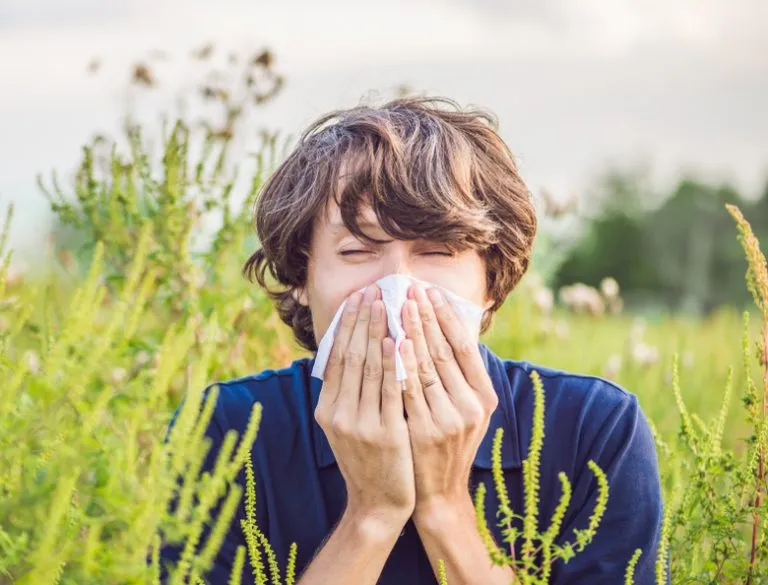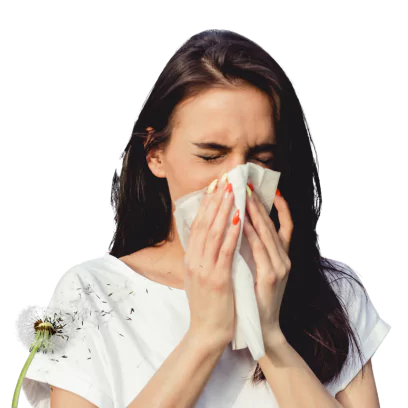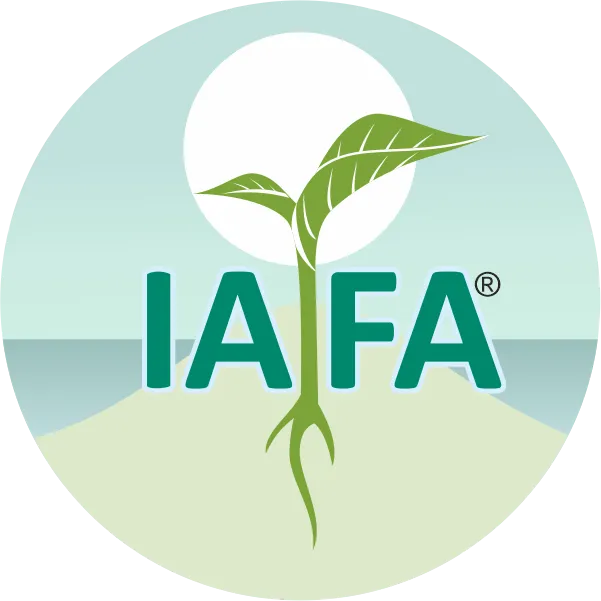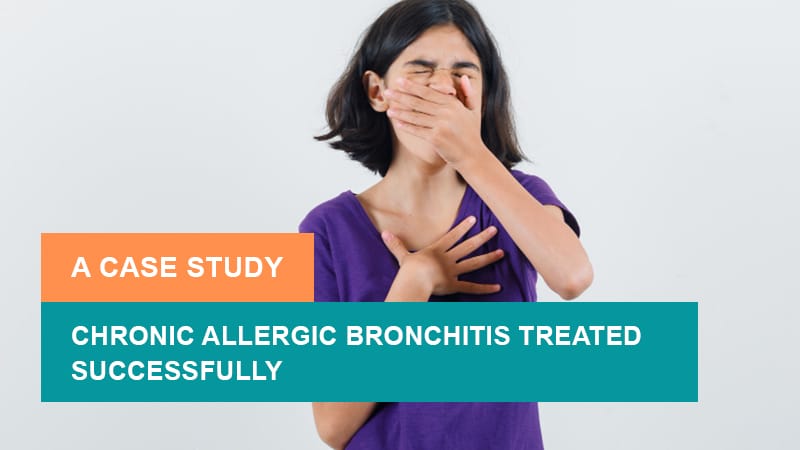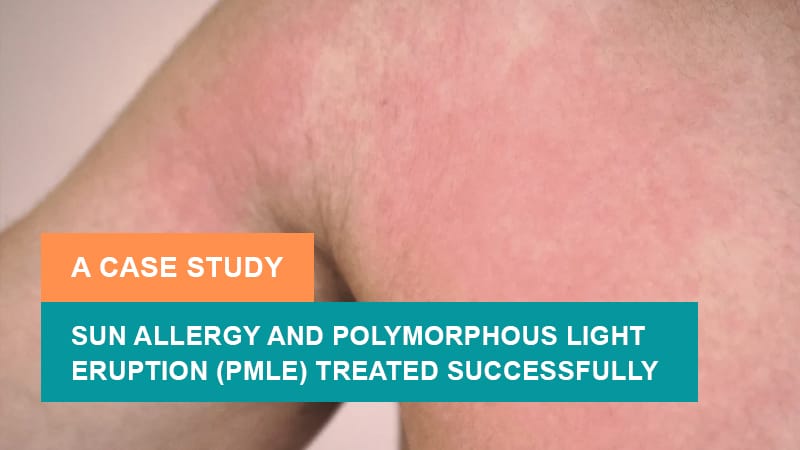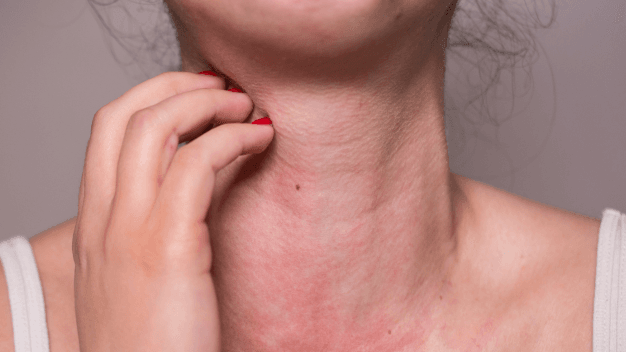On This Page
What is a Pollen Allergy?
The allergic reaction triggered by pollen grains released by plants such as trees, grasses, and weeds are often referred to as allergic rhinitis or pollen allergy or hay fever. Hay fever is also known as seasonal allergic rhinitis or seasonal rhinitis. As one of the most common allergies worldwide, Pollen allergy affects millions of people, causing discomfort and disrupting daily activities during peak pollen seasons, as it in the most allergy worldwide.
Pollen allergy also known as Allergic rhinitis is the highly prevalent disease that affects 40% of children and 20-30% of adults worldwide. In response to inhaled environment allergens that are various types of pollens from trees, grasses and weeds (like ragweed, birch, walnut), the immunoglobulin E (IgE) mediated inflammation of the nasopharynx occurs which leads to pollen allergy.
Do you find yourself frequently bothered by seasonal changes due to the onset of allergies? If with the changing season, you are suffering from symptoms like sneezing, runny nose, and red nose then it is the immunological response of your body to the certain substance that triggered your immune response to release histamine in the body which results in the above symptoms.
Pollen Allergy – As Per Ayurveda
In Ayurvedic Samhitas, the concept of allergy was not new, the only difference is that the word Allergy has not been used in the classical literature of Ayurveda. The concept of pollen allergy can be studied and understood on the concepts of Ama dosha, Asatmya, and Virudhdhara in Ayurveda. The symptoms of the pollen allergy are co-related with Pratishaya types specifically Vataka Pratishaya.
What is Pollen?
Pollen is a fine powdery substance that acts as an airborne allergen, released by the plant during the fertilization process in the spring, summer, fall, and sometimes winter seasons. It is the yellow structure or powder that is formed at the end of the stamen of the flower the male reproductive part of the flower.
Who Gets Affected by Pollen Allergy?
The pollen allergy affects people of all ages with children, adult and old age. Along with this Research is still going on but various studies suggest that the maximum times the pollen allergies run in families. So, if someone in your family is suffering from allergies then you might have allergies too. But if you mostly avoid the allergen then even if you have genetic susceptibility to suffer from pollen allergy, you may not develop a problem.
How Common is Pollen Allergy?
Today pollen allergies are becoming a global health concern as increase in pollen allergy cases is concerning trend that has been observed in recent years which shows great impact on individual quality of life and also a big reason for socio-economic strain.
- In the U.S., approximately 81 million people in the U.S. were diagnosed with pollen allergy (hay fever). This is equivalent to 26% (67 million) of adults and 19% (14 million) of children. (Reference – Ng, A. E. & Boersma, P. (2023). NCHS Data Brief, no 460: Diagnosed allergic conditions in adults: United States, 2021. National Center for Health Statistics. https://dx.doi.org/10.15620/cdc:122809)
- Non-Hispanic Black children and non-Hispanic white children were more likely to have a pollen allergy than Hispanic and non-Hispanic Asian children. (Reference – Zablotsky, B., Black, L.I., & Akinbami, L. J. (2023). NCHS Data Brief, no 459: Diagnosed allergic conditions in children aged 0- 17 years: United States, 2021. National Center for Health Statistics. https://dx.doi.org/10.15620/cdc:123250)
What are the Types of Pollen Allergy?
Pollen allergy varies according to the different allergens. Some of the most common types of pollen allergy are as follows:-
- Grass Pollen Allergy: The allergy that is mostly active during summer and most common is grass pollen allergy in which it is difficult to treat symptoms as it is very severe. The most common Grass pollen allergens are Bahia, Bermuda, Fescue, Johnson, Kentucky blue and Timothy.
- Ragweed Pollen Allergy: The most common weed allergen that is active during autumn month and late spring is known as ragweed pollen allergy which is approximately 15% common in people. Tumbleweed and sagebrush are also weed that causes pollen allergy.
- Birch Pollen Allergy: The most common cause of pollen allergy during the spring season is Birch pollen allergy.
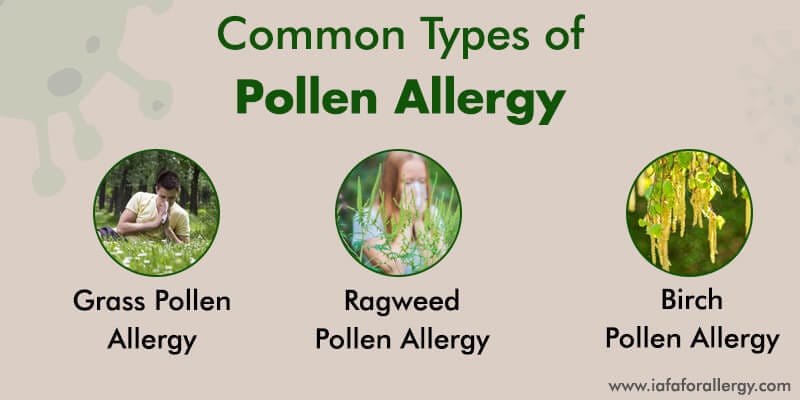
What are the Most Common Pollen Allergens in Different Parts of World?
The pollen allergens throughout the world varies according to geographical location and the environmental factor of that particular country.
The top allergens that are found in the USA are Oak, Cedar, Birch, Sweet Birch, Maple, Pine, Ass, Elm, Olive, Willow, Sycamore, Alder, Sweet Gum, Cotton Wood, Juniper, Poplar, Hickory, Walnut, Mulberry, Etc.
What are the Causes of Pollen Allergy?
The main causes of pollen allergy are as follows:-
- Pollen Exposure: When people are exposed to pollen grains present in the air, their immune system produces an allergic response to the foreign proteins present in the pollen.
- Genetic Factors: Some people are genetically predisposed to pollen allergies and have some genetic factors that make them more susceptible to seasonal allergies.
- Environmental Factors: Changes in weather conditions like strong winds can result in increased pollen concentrations which increases the risk of allergic reactions.
- Cross-Reactivity: People who are allergic to pollen grains may also experience increased sensitivity to some proteins in various fruits, vegetables, or nuts like peanuts.
- Previous sensitization: Earlier exposure to pollen grains can sensitize immunity and make the person even more prone to allergies in the future.
These factors may predispose to some symptoms that occur due to pollen allergies.
Causes of Pollen Allergy – As per Ayurveda
Staying in dew (cold / frosty), living in dust and air, by speaking too much, sleeping a lot, by drinking foreign water (by drinking impure water), extreme water sports lead to aggravation of Vata Dosha and Dosha gets situated in the nose causing Pratishyaya.
What are the Symptoms of Pollen Allergy?
The most common symptoms of pollen allergies are as follows:
- Rhinorrhea (Runny nose) – Commonly thin and clear nasal discharge
- Nasal congestion or nasal blockage also known as a stuffy nose
- Itchy ears, nose, eyes and mouth
- Watery eyes
- Redness in eyes
- Sneezing
- Swelling around the eyes
Ayurvedic Reference of Pollen Allergy
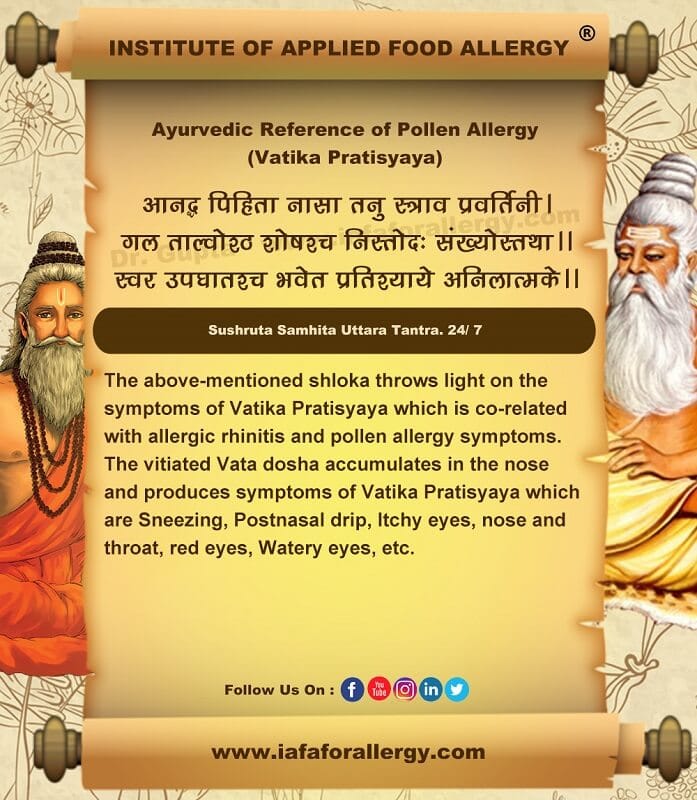
Symptoms of Pollen Allergy – As per Ayurveda
The vitiated Vata dosha accumulates in the nose and produces symptoms of Pratisyaya. Ayurveda has elaborately explained the aggravation of different elemental energies namely Vata, Pitta, and Kapha during different changes in seasons. The rainy season witnesses variations in Vata dosha and manifests symptoms such as restlessness, dry cough, dryness in the eyes, headache, and sneezing. Pitta dosha is aggravated during autumn and produces symptoms like redness, burning of eyes, rashes, and headache. Kapha dosha becomes vitiated during the spring season and produces symptoms like runny nose, nasal stuffing, heaviness, and watery eyes.
How to Diagnose Pollen Allergy?
As per Ayurveda, the diagnosis of pollen allergy will be made according to Eightfold examination i.e. Asht Viddha Pariksha and Dasha Viddha Pariksha (Tenfold examination) which involves assessment of Prakriti (individual constitution), Dosha (body type), Agni (digestive fire), Nadi Pariksha (pulse diagnosis), etc.

“Institute of Applied Food Allergy® is the number one Ayurvedic Institution for the treatment of Allergies including “Pollen Allergies.” If one follows the complete package of oral medicines and detoxification procedures then allergic conditions like “Pollen Allergy”, “Hay Fever”, or “Allergic Rhinitis” will be a thing of the past.
Visit us today and Bid Farewell to your allergy!!!
– Dr. Sahil Gupta (B.A.M.S., M.H.A.)
Ayurvedic Allergy Specialist
CEO & Founder of IAFA®
At last, Easier Pollen Allergy Management

Trusted by
More than 90,000 Patients

Convenient
at-Home Treatments

9.2 / 10
Customer Satisfaction Score
Pollen Allergy Ayurvedic Treatment
For Pollen Allergy Ayurvedic Treatment, Ayurveda recommends various herbs, natural solutions, panchakarma procedures, yoga procedures along with diet and lifestyle guidance. The treatment helps in balancing the vitiated Dosha, strengthening the immune system. Let know in detail below: –
Avoiding the Causative Factors (Nidana Parivarjanam)
Avoidance of causative factors like pollens, dust, etc. has been assumed as the foremost strategy to avoid pollen allergy.
Oil Pulling Therapy (Nasya Karma)
Oil pulling therapy is the procedure in which the instillation of oil medicated with Ayurvedic herbs is administered into the nose in supine position which acts as purification of the respiratory tract. This procedure helps to treat pollen allergy.
Panchakarma Procedures
Panchakarma Procedures (Detoxification therapies) such as Snehapana (Intake of medicated ghee or oil), Swedana (Steaming), Gandusha (Holding medicated liquids in mouth), Vamana (Emesis) and Dhumapana (Intake of medicated smoke) and other external therapies are helpful in the treatment of pollen allergies. These procedures can be undertaken under the guidance of Expert Ayurvedic physicians depending on dosha vitiation and patient condition.
Single Herbs for Pollen Allergy
Single herbs for Pollen Allergy Ayurvedic Treatment includes Haridra (Curcuma longa), Neem (Azadirachta indica), Shirish (Albezzia lebbeck), etc. These herbs exhibits various actions like anti-allergic effect, immune suppressive effect, anti-inflammatory activity, etc. by which it helps to treat pollen allergies.
Diet and Lifestyle Guidance (Pathya-Apathya)
For effective symptoms control and overall well being in pollen allergy, understanding the following do’s and don’ts is crucial. By doing life style modification like minimizing exposure to allergens one can minimize the chances of pollen allergy.
Pathya (Do’s)
- Consuming small grains along with fatty, acidic, and hot meat juices of rural animals and birds.
- Bathing with hot water, use of lukewarm water for drinking, etc.
- Living in a vacuum or hot place.
Other practices that can be followed are mentioned below:
- Include easy-to-digest and warm food
- Food must have a sour taste along with salt to settle the aggravated doshas.
- Hot, sour, and spicy soup
- Use barley, wheat, pomegranate etc.
- Incorporating warm water for internal and external purposes
- Wearing heavy clothes like sweaters in the cold season
- Covering head and throat during the winter season
Apathya (Don’ts)
Avoidance of excessive worrying, exercise, excessive talking and excessive sexual intercourse is absolutely beneficial.
Other practices that should be avoided for pollen allergy are described below:
- Cold and refrigerated food
- Heavy and fatty food
- Intake of excess quantity of water
- Use of cold water for internal and external purposes
- Excess bathing time
- Sleeping during the day
- Emotions like anger, sorrow
Yoga Asanas in Pollen Allergy
One of the best natural solutions to pollen allergy is doing different Yoga procedures such Surya Namskara, Sarvanga Asana, Vriksha Asana, Hala Asana, Matsya Asana, Mayura Asana, etc. Neti like Jal neti, Sutra neti, and Pranayama such as Bhastrika Pranayama. When recommended Yoga procedures are done by the suffering individual, it immunizes the body against allergies, strengthens lung muscles, improves breathing, and relieves the symptoms of pollen allergy. The most common Yoga procedures that can be beneficial in pollen allergy.
Seek Expert Advice
Holistic Treatment by strengthening the immune system and addressing the underlying imbalances of Dosha helps to manage pollen allergy. IAFA® is a one-stop solution for holistic treatment of pollen allergies as Dr. Sahil Gupta (Ayurvedic Allergy Specialist at IAFA®) is working on pollen allergy from more than 15 years and treated more than 50000 patients related to allergies with personalized treatment. Mark your presence today and wave goodbye to your allergies.
Schedule an Appointment with IAFA® to manage and address pollen allergy conditions effectively.
Frequently Asked Questions
Question 1) What Month is Pollen the Highest?
Answer: The pollen season or month in which pollen season is peak depends on the region and the plants that are present in that particular region. However, typically the weed release pollens in late summer and fall, trees release pollens in early spring and grasses release in early summer and late spring.
Question 2) Are Pollen Allergies Contagious?
Answer: No, Pollen allergy are not contagious. The diseases that occur from one person to other or occurs due to infectious agent like virus, bacteria are contagious. However, pollen allergy develops due to over reaction of immune system to exposed pollen allergens.
Question 3) Does Pollen Allergy Go Away on its Own?
Answer: Allergy in individual life depends upon various factor like their exposure to the various environment, weather, their immunological function, exposure to pollen allergens etc. Some individuals get relief from pollen allergy by avoiding allergens but in most cases management strategies are required to control the pollen allergy.
Question 4) What Happens If Pollen Allergies is Left Untreated?
Answer: Severe complication and exacerbation of diseases like sinusitis, asthma, conjunctivitis, sleep disturbance, ear infection, etc. can occur if pollen allergy is left untreated.
Question 5) What is the Best Remedy for Pollen Allergies?
Answer: As per Ayurveda, the best remedy for pollen allergy depends on the severity of the disease and symptom of the individual. Different treatment like Panchkarma therapy, use of combination of different herbs and and natural diet will help to reduce the severity of the pollen allergy.
References
- Tripathi Brahmanand and Pandey G.S, Charaka Samhita of Agnivesa with Charaka Chandrika Hindi Commentory, 6th Ed., Varanasi: Chaukhamba Surbharati Prakashan., (Vol-II), 1999.
- Shastri K. Ambikadatta, Sushruta Samhita of Maharsi Sushrut edited with Ayurveda Tattva Sandipika Hindi Commentary, 13th Ed., Varanasi: Chaukhamba Sanskrit Bhawan., (Vol-II), 2000.
- Vagbhatta Astanga Hridaya, Nidana Sthana, Chikitsa Sthana, edited by Y. Upadhaya, Chaukambha Prakashan, Varanasi, 2012.
- Kaviraj Govind Das Sen. Bhaisajya Ratnavali, edited by Mishra S, Chaukhamba Surbharati Prakashan, Varanasi, (Reprint ed.). 2013: 43.
- Chavan, Ajay & Gujarathi, Rahul & Chavan, Dr & Khedekar, Sumod & Mukhedkar, Ankita. (2023). Allergic Rhinitis and its Explanation in Ayurveda -A Review. 56. 1230- 1238.
- Sharma R, Bhat P. Management of allergic rhinitis with Rajanyadi Churna and Guduchi Kwatha – A case report. J Ayurveda Integr Med. 2023 Jul-Aug;14 (4): 100740. http://dx.doi.org/10.1016/j.jaim.2023.100740. Epub 2023 Jul 19. PMID: 37478634; PMCID: PMC-10371786.
- Dahanayake JM, Perera PK, Galappaththy P, Samaranayake D. Efficacy and safety of two Ayurvedic dosage forms for allergic rhinitis: Study protocol for an open label randomized controlled trial. Trials. 2020 Jan 7; 21 (1): 37. https://trialsjournal.biomedcentral.com/articles/10.1186/s13063-019-4004-1. PMID: 31910896; PMCID: PMC- 6947868.
Was this Page Helpful?
So, IAFA’s Root-Cause Treatment of Pollen Allergy is Just 3 Steps Away!

01. Connect With Us
Share your history of illness or Book your appointment

02. Consult With Us
Dr. Gupta a certified Ayurvedic Allergist Consultant

03. Root Cause Treatment
Get an accurate diagnosis, medicines, diet & lifestyle change
Real Case Studies – Successfully Treated Patients
Real Case Studies of Successfully Treated Patients from All Around the World by IAFA Ayurveda®

9 Year Old Female Patient Recovered from Chronic Allergic Bronchitis – A Case Study
This case study presents a 9-year-old female patient who has successfully recovered…

12-Year-Old Child Recovered from Sun Allergy and Polymorphous Light Eruption (PMLE) – A Case Study
This is a case study of a 12-year-old child who has successfully…

40-Year-Old Female Patient Recovered from Dyshidrotic Eczema and Onychomycosis – A Case Study
This case study highlights the successful recovery of a 40-year-old female patient…

40-Year-Old Female Patient Recovered from Urticaria and Angioedema – A Case Study
This case study focuses on a 40-year-old female patient who has successfully…
Read More Articles

Mast Cell Diseases
Discover Ayurvedic treatment for Mast Cell Diseases, including types, causes, symptoms, and…

High Immunoglobulin-E (IgE) Levels
Discover Ayurvedic treatment for high Immunoglobulin-E (IgE) levels. Learn about the causes,…

Histamine Intolerance
Discover Ayurvedic treatment for histamine intolerance, its causes, symptoms, and natural treatment.…

